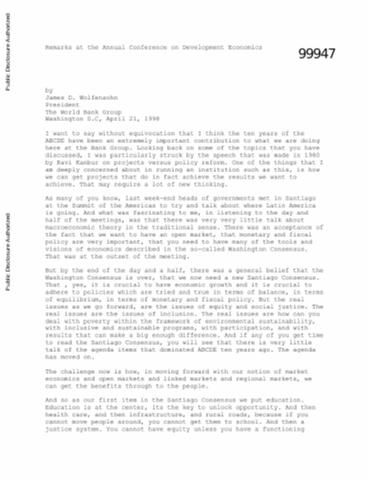The World Bank is a vital source of financial and technical assistance to developing countries around the world. We are not a bank in the ordinary sense but a unique partnership to reduce poverty and support development. The World Bank Group has two ambitious goals: End extreme poverty within a generation and boost shared prosperity.
- To end extreme poverty, the Bank's goal is to decrease the percentage of people living on less than $1.25 a day to no more than 3% by 2030.
- To promote shared prosperity, the goal is to promote income growth of the bottom 40% of the population in each country.
The World Bank Group comprises five institutions managed by their member countries.
The World Bank Group and Land: Working to protect the rights of existing land users and to help secure benefits for smallholder farmers
The World Bank (IBRD and IDA) interacts primarily with governments to increase agricultural productivity, strengthen land tenure policies and improve land governance. More than 90% of the World Bank’s agriculture portfolio focuses on the productivity and access to markets by small holder farmers. Ten percent of our projects focus on the governance of land tenure.
Similarly, investments by the International Finance Corporation (IFC), the World Bank Group’s private sector arm, including those in larger scale enterprises, overwhelmingly support smallholder farmers through improved access to finance, inputs and markets, and as direct suppliers. IFC invests in environmentally and socially sustainable private enterprises in all parts of the value chain (inputs such as irrigation and fertilizers, primary production, processing, transport and storage, traders, and risk management facilities including weather/crop insurance, warehouse financing, etc
For more information, visit the World Bank Group and land and food security (https://www.worldbank.org/en/topic/agriculture/brief/land-and-food-security1
Resources
Displaying 4856 - 4860 of 4907Remarks at the Council of Foundations
James D. Wolfensohn, President of the World Bank Group, discussed the issues that link the United States to other countries: health, migration, trade, peace and stability, energy, food, and crime and narcotics. The responsibilities of foundations do not end with our cities and communities. The job the Bank does can only be done on the basis of partnership with the governments, with the other multilateral institutions, with the private sector, but most particularly with civil society.
Remarks at the Annual Conference on Development Economics
James D. Wolfensohn, President of the World Bank Group, discussed that it is crucial to have economic growth and it is crucial to adhere to policies which are tried and true in terms of balance, in terms of equilibrium, in terms of monetary, and fiscal policy. The real issues are how can one deal with poverty within the framework of environmental sustainability, with inclusive and sustainable programs, with participation, and with results that can make a big enough difference.
Capital Outflow from the Agriculture Sector in Thailand
To understand Thailand's policy on development and industrialization, one must also study its policy on trade and agriculture. Certain Thai policies have facilitated economic development in Thailand: Raising agricultural productivity even during the early period of import substitution. The relatively equal distribution of land. Decentralized industrial growth. The labor-intensive export orientation of both rural and urban industries. Generally open, merit-based access to education.
The Challenge of Inclusion
This is the address to the Board of Governors, delivered by Mr. James D. Wolfensohn, President of the World Bank, in Hong Kong, China, on September 23, 1997. This year's core theme is the challenge of inclusion, bringing people into society who have never been part of it before, the main reason why the World Bank Group exists. On reviewing the state of development circa 1997: despite improved social indicators, the rapid rise in life expectancy levels, and freedom ascending, much still needs to be improved.
The determinants of agricultural production : a cross-country analysis
Capital is important to agricultural production, so policies that improve access to agricultural capital will facilitate growth, if the capital is used efficiently. In this analysis of capital's role in agricultural production, a new construction of data on capital allowed Mundlak, Larson, and Butzer to advance the cross-country study of production functions. The model reveals the relative importance of capital, a finding quite robust to modifications of the model and the disaggregation of capital to its two components.









